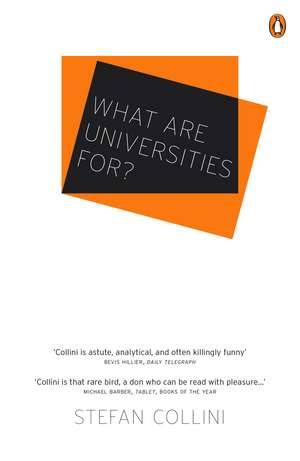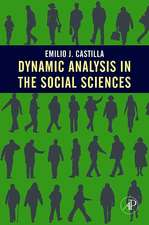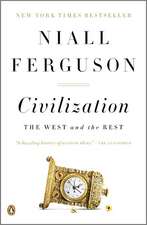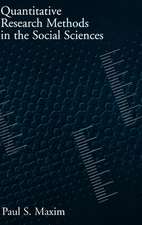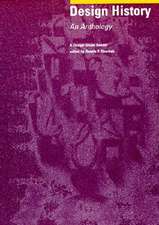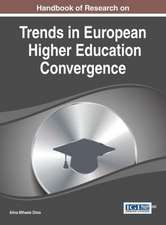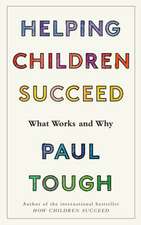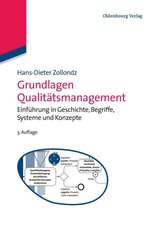What are Universities For?
Autor Stefan Collinien Limba Engleză Paperback – 22 feb 2012
Stefan Collini challenges the common claim that universities need to show that they help to make money in order to justify getting more money. Instead, he argues that we must reflect on the different types of institution and the distinctive roles they play. In particular we must recognize that attempting to extend human understanding, which is at the heart of disciplined intellectual enquiry, can never be wholly harnessed to immediate social purposes - particularly in the case of the humanities, which both attract and puzzle many people and are therefore the most difficult subjects to justify.
At a time when the future of higher education lies in the balance, What Are Universities For? offers all of us a better, deeper and more enlightened understanding of why universities matter, to everyone.
Preț: 69.13 lei
Nou
Puncte Express: 104
Preț estimativ în valută:
13.23€ • 13.76$ • 10.92£
13.23€ • 13.76$ • 10.92£
Carte disponibilă
Livrare economică 22 martie-05 aprilie
Livrare express 11-15 martie pentru 17.36 lei
Preluare comenzi: 021 569.72.76
Specificații
ISBN-13: 9781846144820
ISBN-10: 1846144825
Pagini: 240
Dimensiuni: 129 x 198 x 14 mm
Greutate: 0.18 kg
Editura: Penguin Books
Colecția Penguin
Locul publicării:London, United Kingdom
ISBN-10: 1846144825
Pagini: 240
Dimensiuni: 129 x 198 x 14 mm
Greutate: 0.18 kg
Editura: Penguin Books
Colecția Penguin
Locul publicării:London, United Kingdom
Notă biografică
Stefan
Collini
has
become
one
of
the
most
respected
voices
in
public
debates
about
universities
and
their
place
in
modern
society.He
is
a
Professor
of
Intellectual
History
and
English
Literature
at
Cambridge
University
and
Fellow
of
the
British
Academy,
who
frequently
contributes
toThe
Guardian,The
London
Review
of
Books,The
Times
Literary
SupplementandThe
Nation.Reviewers
of
the
recent,Common
Reading:
Critics,
Historians,Publics(2008),
described
him
as
'one
of
Britain's
finest
essaysists
and
writers.'Other
works
includeAbsent
Minds:
Intellectuals
in
Britain(2006),Public
Moralists(1991),Matthew
Arnold:
a
Critical
Portrait(1994)
andEnglish
Pasts:
Essays
in
History
and
Culture(1999).
Recenzii
An
eloquent
and
impassioned
book
Collini is astute, analytical, and often killingly funny
Collini is that rare bird, a don who can be read with pleasure
One of Britain's finest essayists and writers
[A] timely lecture for the coalition of dunces ... this is a closely argued defence
The book is a bit like some university courses. It is erudite, well argued, carefully researched, a fine addition to the debate about the purpose of university education
[Collini is] stern and splendid in his brief history of the hot debate on useful versus useless knowledge
It is extremely well written: Collini's prose is lively, well-reasoned and persuasive. The book is a refreshing example of a faculty member engaging with the wider issues of higher education rather than perceiving them through the narrow prism of his own discipline ... a valuable, timely contribution to the discourse
A critique both pointed and witty
Collini writes beautifully
Collini puts his finger on the nub of the problem facing universities. Collini's book is a must-read
Collini is astute, analytical, and often killingly funny
Collini is that rare bird, a don who can be read with pleasure
One of Britain's finest essayists and writers
[A] timely lecture for the coalition of dunces ... this is a closely argued defence
The book is a bit like some university courses. It is erudite, well argued, carefully researched, a fine addition to the debate about the purpose of university education
[Collini is] stern and splendid in his brief history of the hot debate on useful versus useless knowledge
It is extremely well written: Collini's prose is lively, well-reasoned and persuasive. The book is a refreshing example of a faculty member engaging with the wider issues of higher education rather than perceiving them through the narrow prism of his own discipline ... a valuable, timely contribution to the discourse
A critique both pointed and witty
Collini writes beautifully
Collini puts his finger on the nub of the problem facing universities. Collini's book is a must-read
